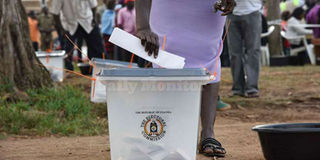Will the people’s will triumph?

A woman casts her vote duing past elections. PHOTO/NMG/FILE.
What you need to know:
- Sadly, we are also recalled those who have left us in the course of the campaigns, those who are injured, and those who didn’t vote because they were in jail or in some way forced behind.
The story of South African liberation is a long one. It cuts across many generations, many decades and many characters. It was a liberation that saw it all. There were days when all hope was lost. There were days when hope was the talk of the day.
But the liberation movements continued the fight day and night. It was clear from the onset that the odds were against the liberation movements led by the African National Congress.
They were up against the might of the South African State. South Africa was a nuclear power with one of the best trained and equipped armies. Its security apparatus led by the notorious Bureau of State Security (BOSS) was one of the most feared in the world with seemingly unlimited resources and an international reach. They had power.
Real or perceived enemies were located, arrested or killed or both. Steve Biko was tortured to death in a police cell. Dulcie September, an ANC activist, was shot five times outside her office in Paris. Ruth First, a White ANC activist, was blown to bits when a letter bomb was delivered to her office in Maputo.
Nelson Mandela and many others languished in jails across the country. The message was loud and clear. The South African State was not to be messed with. And boy! did it affect the psyche of the liberators. But the oppressed people were not deterred. They sang songs of hope and courage.
The streets were filled with protests every other day, but the South African State ignored these pleas. They insisted they were doing the right thing. Black and White couldn’t live together. In some cases, they labelled the liberators communists.
When 29 school children were killed during a peaceful protest that became known as the Sharpville Massacre, no actions were taken against the perpetrators and the State was unapologetic. The ANC and other anti-apartheid organisations were banned. But the people did not relent and continued the fight.
Like it was in apartheid South Africa, the rest of the people continue to fight and dream for the right to be and remain free. And they will be free.
Philip Ndamira,
[email protected]
Newly elected leaders have their work cut out
Ugandans yesterday went to the polls to elect their leaders. This day was reserved for every citizen to exercise their constitutional right to vote after the noise and clutter of the extremely difficult campaigns.
This after everything they saw and heard from the candidates during the dragging campaigns. Yesterday was the moment of truth.
It is about what kind of country we desire to see for ourselves, our families and fellow citizen. What aspirations we have for Ugandans of today and tomorrow. A decision that everyone has to make for themselves in all seriousness, and in all consciousness. Regardless of our differences, political, religious or ethnic, we all voted for Uganda. We decided if the Pearl of Africa moves forward to embrace the values we aspire to see.
We decided if we want to see the sovereignty of the people firmly established. We decided if we want a leadership that cares and serves all the people of this country equally rather than support those contesting simply to help themselves.
Sadly, we are also recalled those who have left us in the course of the campaigns, those who are injured, and those who didn’t vote because they were in jail or in some way forced behind. The lucky ones who took the patriotic duty of voting are, therefore, the ones who hope for a brighter Uganda.
A Uganda of genuine peace that is felt in each heart of every single citizen regardless of political affiliation, and the Uganda of true freedom and equitable prosperity for all, where everyone who works hard has a fighting chance to succeed in life, as opposed to seeing the corrupt acting as the country’s role models. A Uganda that looks to the rays of the future, rather than that of the past.
Hussein Amin,
Kampala
It was all calm voting at my centre
I have been an ardent voter, having participated in all elections since 1996, exercising my constitutional right to vote and elect a leader(s) of my choice. However, what I witnessed during this election at my voting centre this year has left me happy with the Electoral Commission. The voting process at Kisugu Church of Uganda polling station was very smooth.
The organisation and order exhibited by the voters, Electoral Commission officials and even the police were quite satisfactory. Social distancing was observed, hand-washing and sanitising was in place and the environment was quite clean. Even after voting, one was required to sanitise again.
If this is what also transpired at different voting centres and polling stations around the country, then one can say the standard operating procedures were adequately observed and the processes and procedure could therefore not be blamed for any failure during this election, at least at my voting centre.
Benard Majore,
Kampala




